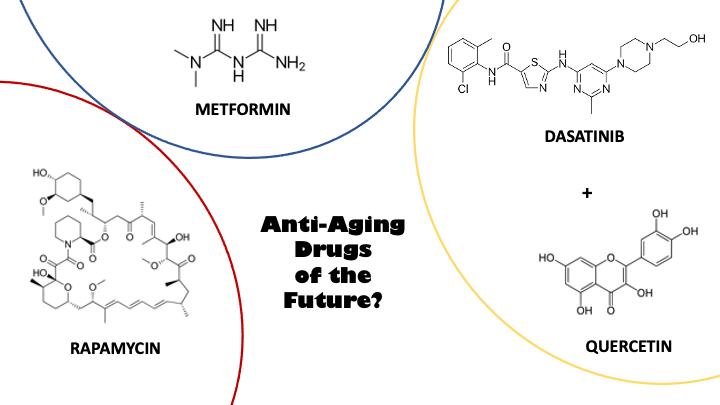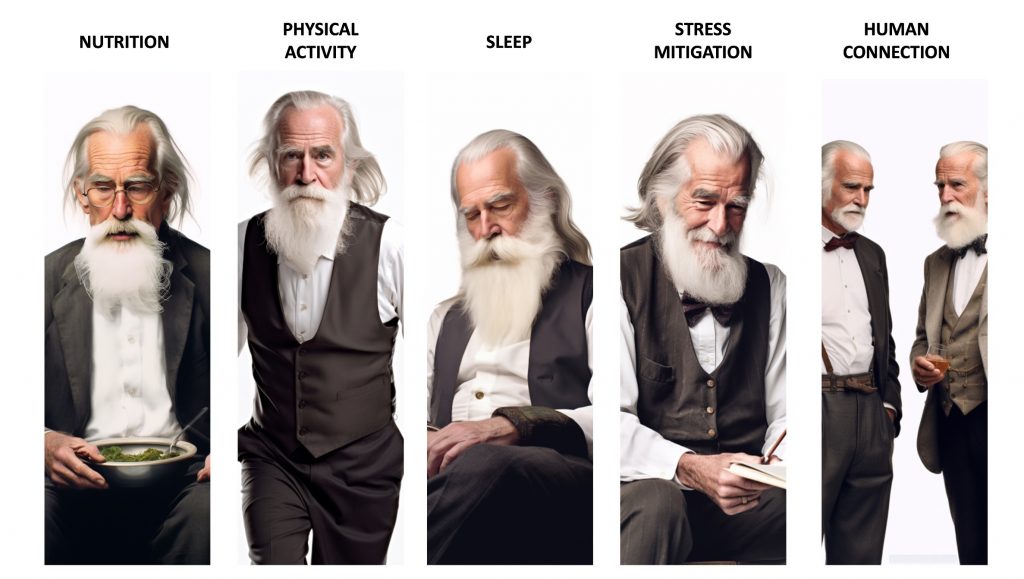Key Points:
- Dr. Verdin says that rapamycin, metformin, or senolytics could potentially be the first drug to increase human lifespan, which may occur within the next 10 years.
- Nutrition, physical activity, sleep, stress mitigation, and human connections are lifestyle habits that should be followed to live longer, according to Verdin.
The Buck Institute for Research on Aging in California is the “first independent biomedical research institute in the world focused solely on aging.” Their mission is to “end the threat of age-related disease for this and future generations.” Their President and CEO Eric Verdin, M.D., is “a highly cited scientist (top 1 percent) recognized for his research with a Glenn Award for Research in Biological Mechanisms of Aging.”

In the December 13, 2023 episode of Longevity by Design, Verdin discusses the latest in longevity research with Gil Blander, Ph.D., “internationally recognized for his research in the basic biology of aging” and Ashley Reaver, M.S., a registered dietitian. As part of the conversation, Verdin talks about the future of anti-aging drugs and the most important interventions to improve lifespan.
The Future of Anti-Aging Drugs

When Verdin is asked if he thinks there will soon be a drug that can significantly extend the lifespan of humans, he responds confidently with, “Yes, I do see these drugs coming…”
He thinks there is enough data on rapamycin — currently prescribed to prevent organ transplant rejection — to suggest that it may increase human lifespan. He also puts metformin — an anti-diabetes drug — and senolytics on the list of potential lifespan-extending drugs.
Senolytics are a class of compounds that selectively eliminate senescent cells, which are dysfunctional cells thought to drive the aging process. When Verdin says senolytics, he is probably referring to dasatinib — a chemotherapy drug — which is almost always paired with the natural senolytic quercetin, found in many fruits and vegetables. The dasatinib and quercetin (D+Q) combo is one of the most commonly used senolytic interventions used in anti-aging experiments.
Verdin wraps up his answer by saying it’s hard for him to imagine that we will not have the “first drug that targets a true aging process” within the next 10 years. With that being said, Verdin remarks,
“I think that we already have an anti-aging medicine today, which is physical activity.”
Interestingly, he predicts that finding a medicine that will mimic physical activity, such as walking for 30 minutes a day, will take longer than 10 years. He also argues that the aging field should focus more on lifestyle interventions than anti-aging drugs.
Lifestyle Interventions

“For me, the idea of popping a pill hoping to increase your lifespan without having optimized everything else doesn’t really make much sense.” — Dr. Eric Verdin
When asked what the most important lifestyle interventions are for extending lifespan, Verdin first mentions nutrition. Expanding on what nutrition means, he says it’s not just about what to eat but also when not to eat. He then refers to fasting, which is not eating for extended periods of time. Fasting methods include intermittent fasting, which is not eating for more than a day and time-restricted feeding which is not eating for at least 16 hours a day.
According to Verdin, physical activity is one of the strongest lifestyle interventions. He says that physical activity can “simply be walking, but also gardening — it’s just being mobile — not sitting in a chair …” He goes on to say that there is evidence that people who move around all day live longer. While more research is needed, a combination of resistance exercise and cardiovascular exercise, along with balance and stretching exercises seem to optimize for longevity.
Verdin says that when he doesn’t get enough sleep “all his willpower and determination goes out the window,” so sleep is important, especially for brain health. Continuing, he says stress mitigation is also key, “not so much the external stress but how you perceive it.” Ways to mitigate stress include physical activity, getting enough sleep, scribing your experiences to identify stressors, and human connections.
According to several studies, human connection is the strongest predictor of lifespan, Verdin says. He thinks more research is needed to answer the question, “What is it about having a strong social network that makes people live longer?” He postulates that it gives people purpose and a sense of belonging. Still, Verdin says, these areas are so hard to measure in the lab that most researchers ignore them.
Notably, there is research showing that, in humans and animals alike, adverse social conditions can promote chronic stress, which is associated with inflammation. Chronic low-grade inflammation is a hallmark of aging, an underlying biological process that drives aging. Therefore, human connections may increase longevity by reducing stress.
A Little Could Go a Long Way
Verdin concludes by mentioning studies showing that the effects of nutrition, physical activity, sleep, stress mitigation, and human connections are additive. He says,
“So, if you look at people who don’t exercise but who do all the other [lifestyle interventions], they live longer, but if they add exercise on top they live even further.”
He thinks of each lifestyle intervention as a bucket that can be filled individually. However, each bucket need not be filled every day, but filling each bucket just a little whenever possible can help with a longer life.